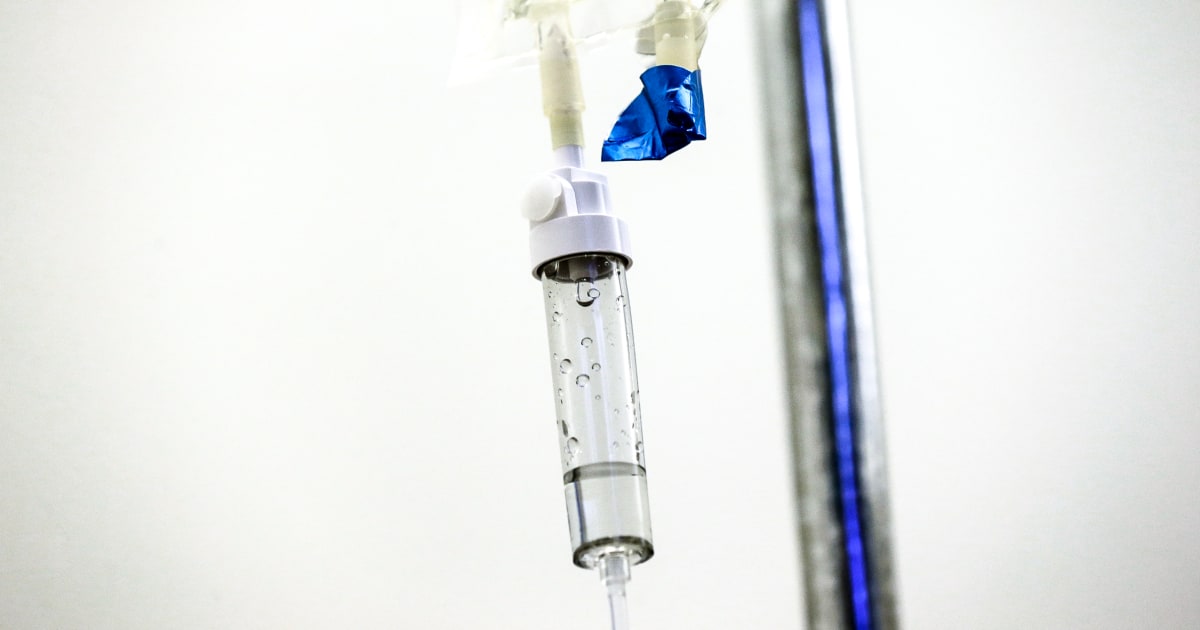Robert Landfair, 76, was diagnosed with stage 4 prostate cancer in 2018.
After several unsuccessful rounds of chemotherapy, his doctor, Alan Tan of Rush University Medical Center in Chicago, recommended that he switch to Pluvicto, a new drug for advanced prostate cancer.
But the drug’s maker, Novartis, has had supply problems. Landfair is now on a waiting list for the drug, which is not expected to be widely available for several more months.
“I definitely need that drug,” said Landfair, of Chicago. «It’s the only way I see my life.»
His family says his cancer is «aggressive and continues to grow.»
“We realize that cancer is not on a waiting period, it is not on pause,” said Raymond Jackson, Landfair’s son-in-law. «We are very worried».
Landfair is not alone: Cancer drug shortages have created dire circumstances for many patients diagnosed with the disease, forcing them, along with their doctors, to make difficult decisions.
According to the Food and Drug Administration, there are shortages of four cancer drugs: Pluvicto, for advanced prostate cancer, as well as methotrexate, cisplatin, and fluorouracil, common chemotherapy drugs used to treat a wide range of cancers, from the skin to the bones and lungs. There is also said to be a shortage of a fifth drug, a bladder cancer therapy called BCG, according to Dr. Vignesh Packiam, a urologist at the University of Iowa Hospitals and Clinics.
In places where cancer drugs are running out, some patients may be forced to turn to options that may not work as well, experts say. Others may die waiting for drugs in short supply to become available. Every day counts: A study published in 2020 in The BMJ found that each month of delay in cancer treatment can increase the risk of death by about 10%.
“We’re kind of handcuffed here as oncologists,” said Tan, who is the director of genitourinary medical oncology at Rush.
Tan hospital is facing a shortage of Pluvicto and cisplatin.
“This is the life of a patient,” he said, adding that patients are “going to die” if they don’t get the medicines they need.
What is causing the cancer drug shortage?
Michael Ganio, senior director of pharmacy practice at the American Society of Health System Pharmacists, which tracks drug shortages across the country, blamed the cancer drug shortages on a lack of investment by manufacturers.
Many of the cancer drugs in short supply are generic drugs, which save the nation’s health system money as a whole, but are not very profitable for drug manufacturers.
“There is little incentive to invest in generic manufacturing, often, especially for these much older drugs; the margins are not very large,” Ganio said. «It’s almost a disincentive.»
Erin Fox, senior director of pharmacy at the University of Utah Health, said poor manufacturing practices at US factories have also contributed to general drug shortages.
Drug shortages, including lifesaving cancer drugs, could worsen in the coming years as more drug production moves overseas, Fox said.
«A key challenge in assessing drug shortages is that pharmaceutical companies are not required to disclose exactly which company is manufacturing the product, as well as the location,» he said, noting that manufacturing is often outsourced abroad. .
Sarah Ryan, a spokeswoman for the Pharmaceutical Research and Manufacturers of America, the pharmaceutical industry’s trade group, said manufacturers have «broad measures» in place to help prevent and mitigate drug shortages.
TO report published in March by the Senate Committee on Homeland Security and Government Affairs found that shortages of new drugs in the US increased by nearly 30% from 2021 to 2022. The drugs included prescription drugs and cold and flu drugs for children, as well as drugs used to treat cancer, according to the report.
The FDA is working to curb the trend. This month, the agency launched 17 pages of draft guidance aimed at preventing drug shortages. It would require drugmakers to notify the agency at least six months in advance of a possible shortage or discontinuation of a drug, as well as more information about the cause of the problem.
less than ideal care
Meanwhile, more cancer patients may receive less than ideal care, said Packiam, of the University of Iowa Hospitals and Clinics.
Packiam learned last week that his hospital had run out of cisplatin, a chemotherapy drug that is commonly used for bladder cancer and improves the likelihood that surgery will be successful.
It is «generally considered the gold standard treatment for this type of cancer,» he said.
The shortage of cisplatin means you will have to have surgery without chemotherapy.
“Alternative chemotherapies that don’t use cisplatin don’t give as good a response,” he said. «So instead of giving suboptimal chemotherapy, the next best thing is to proceed directly with surgery.»
The hospital will also have to prioritize what cisplatin it has left to those most in need, he said.
For those who don’t get their cancer drugs right away, all they can do is hope.
Landfair, the cancer patient who is waiting for Pluvicto, is optimistic, although doubts sometimes assail him.
“My biggest fear is that I won’t start taking that medication,” he said.

